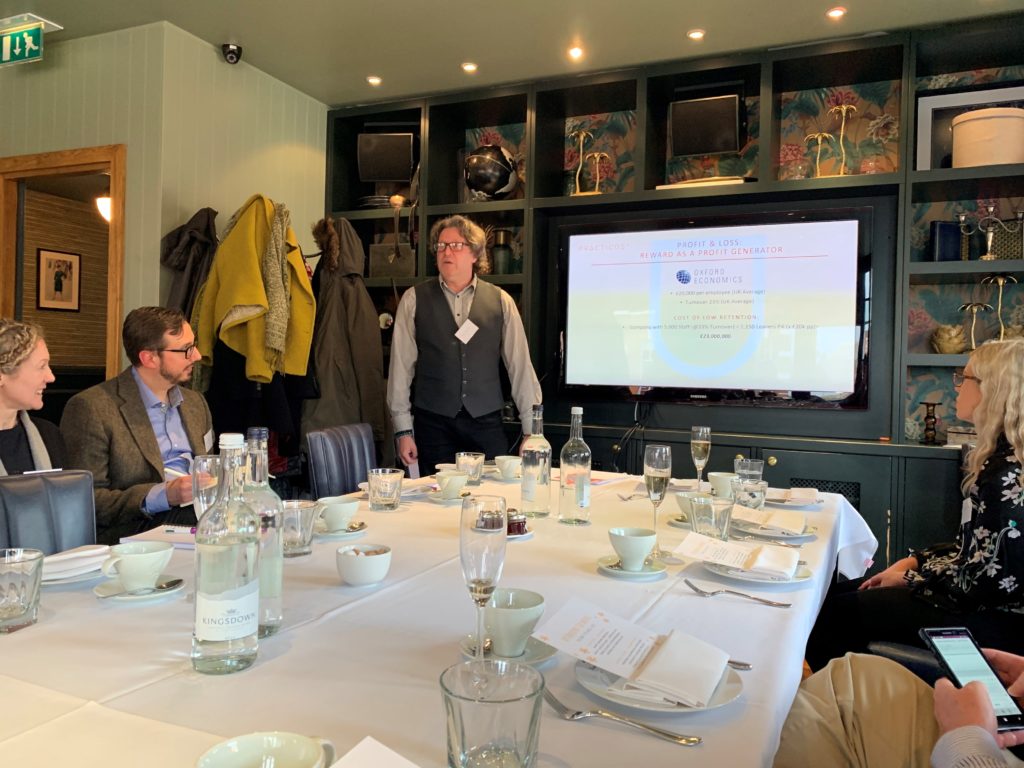HR High Tea: Reward Strategy – Achieving more with Less
On Tuesday 9th April, we ran our ‘HR High Tea: Reward Strategy – Achieving more with Less’ event at Albert’s- Beaufort House in Chelsea to discuss ways companies can do more for less in the HR reward space. The session was led by Nik Butcher from Chuangyi Group.
The premise for the discussion was around how organisations can reward more effectively without having to spend more money.
INTRODUCTION
Nik Butcher gave a short introductory speech on his organisation, Chuangyi Group, and asked us what the name meant, revealing that in Cantonese it translates as Creative Vision, while in Mandarin the meaning is closer to epiphany. The name is inspired by an epiphany that he had about how we, as organisations, should treat people. In short, how you get the most from your investment in staff.
THE SIZE OF THE PRIZE: REWARD AS A PROFIT GENERATOR
Nik introduced Oxford Economics, a well-reputed research company, and offered stats about employee retention, including:
- The Average cost to replace an employee in UK is £30,000, and £20,000 for the industries of those attending that night in particular – even in industries with a high preponderance of minimum wage staff, this average never went below £10,000.
- The average turnover of staff in the UK is 23%.- Nik then modelled this against an organisation with 5,000 staff. 23% turnover equates to 1,150 leavers per annum, multiplying that by the average cost of replacement (£20,000) produces a colossal yearly cost of £23,000,000.
Obviously, every organisation is different and Nik was at pains to point out that this was an illustration and that you need to work out your own company’s figures in the equation. But whichever way you look at it, reducing the turnover of staff produces savings that can be directly sent to the bottom line or used as a powerful investment in the future of the organisation. That’s only part of the benefit, Nik says, because if you lower turnover in the right way through reward that means a workforce that is also more engaged. And a more engaged workforce is one that delivers better against targets and has higher productivity.
WHY DO PEOPLE LEAVE THEIR EMPLOYER?
The main reasons that were brought up around the room included:
- not liking their manager
- not feeling recognised or appreciated
- no career progression opportunities
What’s interesting, is that people very rarely list money in their top three reasons and this gets right to the heart to misconceptions around reward. Paying more rarely makes a meaningful difference to retention.
GENBA-ISM
Nik, a fan of Easten expressions, mentioned the Japanese philosophy of ‘Genba-ism’. In broad strokes it relates to the importance of observing things ‘in the place’, i.e. in order to create and sell a product, be where your customer is – see if from their perspective and observe their behaviour. The same goes for Reward. In order to provide the best reward for your staff, you have to be them. In order to be them, you have to be in the place with them.
Nik asked the room how many times the leaders gathered around the table went out to their organisation’s different sites for any other reason than a formal meeting. He argues strongly for a face-to-face approach to engaging employees over a ‘survey monkey’ approach. Sometimes it will mean more difficult conversations but staff will value it – and it will make staff feel more valued themselves.
FEEL THE BENEFIT
This brought Nik to the very heart of his presentation: how to make people feel valued and rewarded for no cost and no risk.
The main areas he explored included:
- SOCIAL RECOGNITION- “Thanks for that”
It may sound like a small thing but it makes a big difference to how appreciated people feel.
- SOCIAL REWARD- “How’s the family?”
This builds on the idea that social interactions generate a positive sense of wellbeing when a person feels that they belong. Research by psychologists that this type of reward is every bit as powerful, and sometimes more powerful, than non-social rewards.
Social reward will be the next big thing, not least because it contributes to wellbeing. He gave an example to illustrate social reward in practice.
Nic was working for a large super market chain looking at Reward within its distribution division. In staff feedback surveys one of the managers, of which there were many, kept getting glowing scores. Staff just thought this person was the ‘best manager ever’ and said as much.
When he went into the manager’s office, he was confronted with a wall of hundreds of photos behind the managers desk, one of each member of the manager’s staff. Around the photos were notes posted, observations and dates that mattered to each one of these people outside of work. It gave the manager the ability to have a discussion beyond work with each member of staff, e.g. “How was little Meghan’s birthday yesterday?” and so on. It helped him to create a powerful sense of belonging for all his staff.
- ASPIRATIONAL REWARD- “If you could afford it………”
Nik compared aspirational reward to gym membership. Gym membership is the most demanded benefit but it’s also, when offered, the most under used. It’s important, he says, to offer rewards that encourage people to develop themselves and they want to be able to us – something they aspire to. It creates a sense that life is going in the right direction with this company, enables them to imagine the things they are going to do in the future with the organisation and, if it’s related to professional development, improves the talent within the organisation. In short, an ‘as yet’ unused benefit can still be a highly valuable.
- DRIVING ENGAGEMENT- “Salary sacrifice cars + tech for all
This can also be extended into more traditional area of reward, such as a company car scheme. Why not, asks Nik, extend the scheme to partners and spouses? Give them the option? He has done this in several organisations and running two cars per employee on the scheme doesn’t have to mean additional cost, it can be done via salary sacrifice. What it does lead to is an exponentially more engaged member of staff through social reward that extends to their family.
The important thing, says Nik, is to provide options from staff to choose from, to enable a personalised approach to reward.
One of those attending asked, “Isn’t it just likely that everyone will choose to take the whole thing as pay? And as you said earlier, pay alone doesn’t motivate engagement?” Nik replied that the questioner may be surprised, “If you’ve done your homework and the options are attractive then they will be taken up in the vast majority of cases. This is why the genba-ism aspect is so important because it helps you ensure that the choices available are relevant and attractive.”
BONUS OR INCENTIVE?
- Self-Funding?
- Gain-Share?
- Financial or Non-Financial?
Nik was very much against the idea of bonuses, or at least the word ‘bonus’. A bonus sounds like you should get it anyway. His view was that “No-one should have a bonus, but everyone should be incentivised, it’s all about perception”.
The question was asked of him, “should incentives be financial or something else?” His view was that incentives should be meaningful to the person. Often that means non-financial incentives. He’s a big fan of spot incentives but you don’t want to give money away for that. For example, if you’ve got a busy period at the end of the year, give days off extra at Christmas for high performance. It’s important that these are visible too so that you motivate others to want them the next time it they have the opportunity.
One of those attending the presentation gave the example of when she had been looking at reward in a contact centre and rather than financial rewards, they found out what each member of staff really wanted and build an incentive plan for them to be able to reach it. They then took a picture of the item and put it next to their screen. For example, one of the people in the call centre wanted a washing machine, she looked at that picture every day, achieved the performance needed for the company in order to buy her it and then they had it delivered directly to the office to present her with it in front of all the other staff. This approach had a huge impact on retention and also on performance.
WELLBEING PROGRAMME
Nik looks at wellbeing through several lens, including financial, physical, emotional, social and environmental. You have to look at them all at once he says and work with them altogether.
He believes the latest research shows that there has been very little benefit, often just anecdotal, to support current wellbeing programmes. If you are going to run a wellbeing programme, he says, and many of you no doubt already are, I think it’s important to look at the whole person and their family needs. It’s about total wellbeing, so financial wellbeing may be part of that. What can your company offer in terms of loans but just as importantly, what support can you give them around managing money. When they’re on top of their finances and with a plan they actively support to deal with their finances, they are going to be a lot more engaged at work.
REWARD FOR DIFFERENT GENERATIONS
One of those attending brought up reward for different generations, “We’re told we have five different generations within the workforce who value different things – how do we reflect that in our rewards programme?”
Nik’s response was that generational reward is a misnomer, “It’s set up by consultancies to sell you stuff you don’t need. Millennial, X, Y and baby boomer don’t define people really. Yes, I’d agree that you change over the course of your career, you may want to put more towards pension under salary sacrifice later, but it has nothing to with when you were born. Offer them everything!”
SOCIAL PROGRAMMES
Social programmes cost pennies, says Nik, but make a huge difference. It includes things like, Christmas parties for the kids, Easter egg hunts but they have to be genuinely meant and heartfelt. It can’t be a tick in the box programme where HR and management don’t take it seriously. That can spectacularly backfire so if you’re going to commit, you’ve got to properly commit.
FINAL THOUGHTS
- Know your destination
- Know who you need to succeed
- Be honest, be open, be inclusive, be creative
Thank you to Nik for offering us a fantastic insight as to how to do more for less in the HR reward space.
About Chuangyi Group
Chuangi Group are fundamentally a Reward & Engagement Consultancy, but with a very big difference to most other Consultancies. We are truly independent and simply charge for the services we provide our clients. We are not affiliated in any way to any supplier and we will never take any payment for introducing you to any suppliers’ products, so the advice we can give you is the advice you need to realise a vision of highly engaged and happy people working to the best of their abilities to drive their businesses forward to success.
To us, it’s simple. That’s what a Reward & Engagement Consultancy should do. Nothing more and nothing less, so why not get in touch for an informal chat, by email, phone, or video conference, to see if we can help you with any aspect of your Reward plans now and in the future.
Contact us at askus@chuangyi-group.co.uk
About Practicus
Practicus provides problem solving and recruitment. To find out more about the company, see here





0 Comments